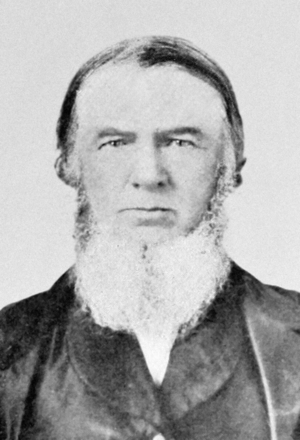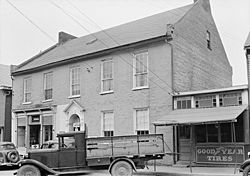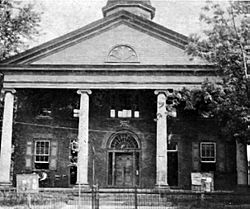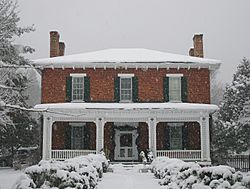John Baker White (clerk of court) facts for kids
Quick facts for kids
John Baker White
|
|
|---|---|

Portrait of John Baker White
|
|
| Clerk of Court for Hampshire County | |
| In office 1815–1861 |
|
| Preceded by | Samuel McGuire |
| Succeeded by | Thomas A. Keller |
| Personal details | |
| Born | August 4, 1794 near Winchester, Frederick County, Virginia, United States |
| Died | October 9, 1862 (aged 68) Richmond, Virginia, Confederate States of America |
| Resting place | Hollywood Cemetery, Richmond, Virginia, United States |
| Political party | Constitutional Union Party (1860–1861) |
| Spouses |
|
| Relations |
|
| Children |
|
| Residences | Liberty Hall, Romney, Virginia (now West Virginia) |
| Occupation |
|
| Military service | |
| Allegiance | |
| Branch/service | United States Army |
| Years of service | 1812–1814 |
| Rank | Ensign |
| Battles/wars | War of 1812 |
John Baker White (born August 4, 1794 – died October 9, 1862) was an important American figure in the 1800s. He was a soldier, a lawyer, and a court clerk in Virginia.
During the War of 1812, White joined the United States Army. He started as a soldier and became an ensign, which is a junior officer rank. In 1815, he became the Clerk of Court for Hampshire County, Virginia. He held this job for a very long time, 46 years, until 1861. He is still the longest-serving Clerk of Court for that county.
As a lawyer and court clerk, John Baker White also taught law to many students. Some of his students later became famous lawyers and public officials. One example is Henry Bedinger, who became a member of the United States House of Representatives and an ambassador.
During the American Civil War, White worried about the county's important records. He loaded land ownership books onto wagons to keep them safe. Because of his actions, these records survived the war. Other records left in the courthouse were destroyed. White was forced to leave his home in Romney because he supported the Confederacy. He moved to Richmond and worked for the Confederate government.
John Baker White came from a family involved in politics. His father, Robert White, was a well-known judge. His son, Robert White, later became the Attorney General for West Virginia. Another son, Christian Streit White, also became a Clerk of Court for Hampshire County.
Contents
John Baker White's Early Life
John Baker White was born on August 4, 1794. His birthplace was near Winchester, in Frederick County, Virginia. He was the youngest of three children. His father was Robert White, an important judge. His mother was Arabella Baker.
John Baker White had other famous relatives too. His great-great-uncle, Alexander White, was a member of the United States House of Representatives. His great-uncle, Francis White, was also a U.S. Representative.
During the War of 1812, John Baker White joined the United States Army. He served as a soldier and was promoted to the rank of ensign.
A Long Career as Court Clerk
After serving in the War of 1812, White moved to Romney, Virginia. In 1814, he became a deputy clerk for the courts in Hampshire County. On March 20, 1815, he became the main Clerk of Court for Hampshire County.
He held this important job for 46 years, from 1815 to 1861. He was re-appointed or re-elected many times. John Baker White is still the person who served the longest as Clerk of Court for Hampshire County. The office was first created in 1757.
Teaching Law and Helping the Community
As a well-known lawyer and court clerk, White also taught law. He taught students in his office and even let them live in his home while they studied. Many of his students became very successful lawyers and public officials.
Some of his notable students included:
- Henry Bedinger, who became a U.S. Representative and an ambassador.
- James Dillon Armstrong, who became a judge in Hampshire County.
- Dr. Robert White, a Presbyterian minister.
- Virginia lawyers Newton Tapscott, Alfred P. White, and Philip B. Streit.
Besides teaching law, White was active in the Romney Literary Society. He also became a trustee for the Romney Academy in 1839. This meant he helped manage the school. He and other trustees could fill empty spots on the board. This helped the academy stay organized.
John Baker White During the Civil War
Before the American Civil War began, John Baker White wanted to keep the United States together. In the 1860 presidential election, he supported John Bell. Bell's party, the Constitutional Union Party, wanted to avoid states leaving the Union over the issue of slavery. In 1861, White voted for candidates who wanted to stay with the Union. One of these candidates was his son-in-law, Colonel E. M. Armstrong.

However, after the Battle of Fort Sumter and other events, White's feelings changed. He began to support Virginia's right to make its own decisions. He also supported the Confederacy. Three of his four sons joined the Confederate States Army. White himself worked to get people in Hampshire County to support the Confederacy. Because of his Confederate views, Union soldiers threatened to arrest him if he didn't leave his home in Romney.
Saving Important Records
From 1861 to 1864, no court meetings happened in Hampshire County. The Hampshire County Courthouse was even used as a stable by Union soldiers. In 1861, Union forces took over Romney. White carefully watched over the county's record books to protect them.
Later in 1861, more Union soldiers moved toward Romney. White became worried again about the safety of the county's records. He loaded important land ownership books onto wagons. He sent them to Winchester for safekeeping. He only sent the bound books, like deed books and wills. He left the loose papers in the courthouse. This way, if one set of records was destroyed, the other might survive.

In 1863, Winchester was no longer safe. White's son, Captain Christian Streit White, took over caring for the records. He moved them to Front Royal. When Front Royal also became dangerous, Captain White moved the records again. This time, they went to Luray Caverns and stayed there for several months.
In 1864, Union soldiers were trying to destroy the record books. Captain White and his company rescued about 150 books. They loaded them into a wagon and took them to North Carolina. The records stayed safe there until the war ended. After the war, the land records were returned to the courthouse. If White hadn't saved them, Hampshire County would have lost all its records.
Union soldiers also took an old Scots Bible from White. This Bible had been passed down in his family. It was taken because he supported the Confederacy.
Moving to Richmond
White left Romney with his wife and younger children. They traveled to Richmond. There, he was offered a job in the Confederate States Department of the Treasury. This was part of the government led by Jefferson Davis.
Later Life and Legacy
John Baker White died soon after arriving in Richmond, on October 9, 1862. He was buried at Hollywood Cemetery in Richmond. Many religious leaders attended his funeral.
His friends and family believed he "died of grief." They thought he was heartbroken over losing his home in Romney. He was also very worried about the county records during the war. Historians Hu Maxwell and Howard Llewellyn Swisher wrote about him in 1897. They praised his dedication to his work and his community.
Family Life
Marriages and Children
John Baker White was married two times. His first wife was Alcinda Louisa Tapscott. They married on December 15, 1815. Alcinda was his cousin. They had three children together:
| Name | Spouse |
|---|---|
| Susan C. White Armstrong | William James Armstrong |
| Juliet Opie White Tabb | Harrison Noble Tabb |
| Arabella White Thompson | Judge Lucas P. Thompson |
His second wife was Frances Ann Streit. They had ten children together. One of their children died as a baby.
| Portrait | Name | Birth date | Death date | Spouse |
|---|---|---|---|---|
 |
Robert White | February 7, 1833 | December 12, 1915 | Ellen E. Vass |
| Louisa Tapscott White Armstrong | July 7, 1836 | August 20, 1887 | Edward McCarty Armstrong | |
| John Baker White II | 1837 | 1858 | Unmarried | |
 |
Christian Streit White | March 10, 1839 | January 28, 1917 | Elizabeth "Bessie" Jane Schultze Catharine Steele |
 |
Alexander White | 1841 | 1884 | Susan L. Williams |
| Henry White | 1842 | 1903 | Unmarried | |
| Frances "Fannie" Ann Armstrong White Flournoy | April 10, 1844 | February 25, 1922 | Samuel Lightfoot Flournoy | |
| Emma C. White | 1846 | |||
| Lucy White | 1849 | |||
| Katherine White | 1849 |
His Home: Liberty Hall
John Baker White and his family lived in a large brick house in Romney. This house was later known as "Liberty Hall." Because he came from a wealthy family, White was able to build a big brick house when he was young.
His first house burned down in 1857. He then built a slightly smaller brick house in its place. He lived there until he left Romney in 1861 during the Civil War. His home was known for its "true old Virginia hospitality." Many people from all walks of life visited his home.
When a new road, the Northwestern Turnpike, was being built through Romney, the plan was to build it through White's garden. White went to court and won his case. This caused the road to be built with a curve in front of his house, which is still there today.
 | Janet Taylor Pickett |
 | Synthia Saint James |
 | Howardena Pindell |
 | Faith Ringgold |


